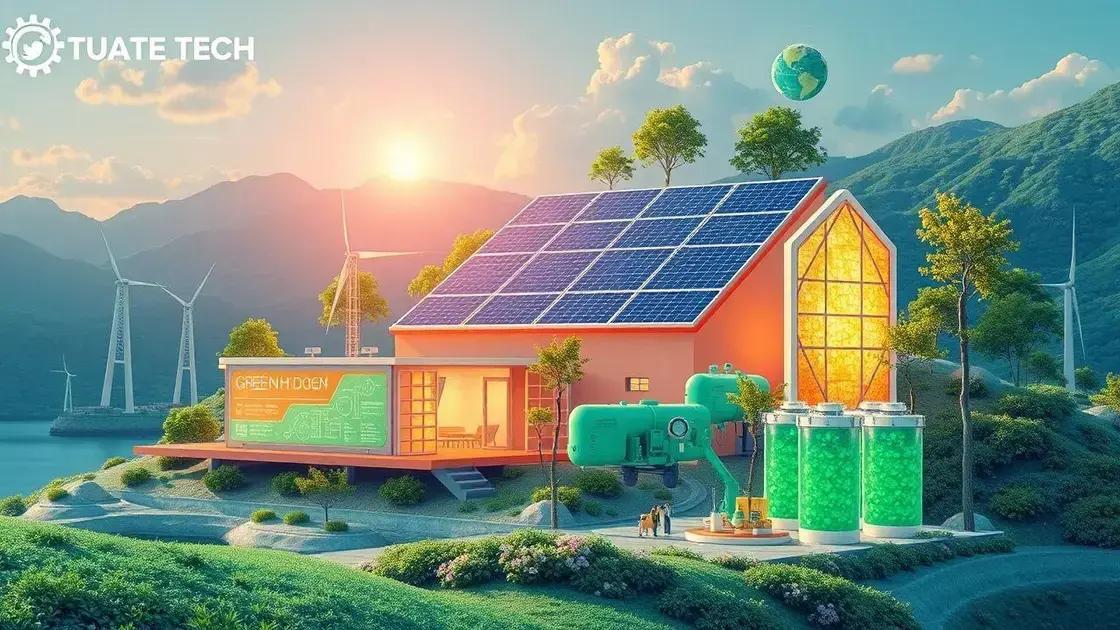Climate tech developments trends shaping our future

Climate tech developments trends focus on innovations like AI, decentralized energy systems, and sustainable practices, which are essential for combating climate change and promoting a greener future.
Climate tech developments trends are at the forefront of combating climate change, driving innovations that transform industries. Have you ever wondered how technology can shape sustainability efforts? Let’s explore some exciting advancements.
Emerging technologies in climate tech
Emerging technologies in climate tech are changing the way we approach environmental challenges. These advancements not only provide innovative solutions but also contribute to building a sustainable future.
Innovative Solutions Transforming Climate Tech
Many innovations are now at the forefront of the climate tech sector. Technologies like carbon capture and storage (CCS) stand out since they help minimize the amount of carbon dioxide emitted into the atmosphere. Additionally, advancements in renewable energy sources such as solar and wind power are making substantial progress in reducing our reliance on fossil fuels.
Key Technologies to Watch
- Hydrogen fuel cells: They offer a clean alternative to fossil fuels for transportation.
- Smart grids: These enhance energy efficiency by allowing real-time data monitoring.
- Energy storage technologies: Such as advanced batteries, play a crucial role in managing renewable energy supply.
- Vertical farming: This method increases food production using less land and water.
As we look ahead, continuing investment in climate tech is vital. It supports research and development, presenting new opportunities to tackle climate change. Staying informed about these technologies can empower individuals and organizations alike.
Furthermore, the integration of artificial intelligence in climate tech is promising. AI can optimize energy systems and improve efficiency across various sectors. With smart algorithms, we could predict energy demands and control resource management more effectively than ever before.
It is essential to recognize the potential of these technologies. By embracing them, we can pave the way for a more sustainable world. Indeed, climate tech is more than just innovation; it’s about taking actionable steps toward preserving our planet for future generations.
Key players in climate tech developments

Key players in climate tech developments are vital to advancing technologies that combat climate change. These organizations range from startups to established companies, all focused on innovation and sustainability.
Leading Companies in Climate Tech
Several major companies are spearheading initiatives in climate tech. Notable names include Tesla, known for its electric vehicles and batteries, and NextEra Energy, a leader in renewable energy. These firms invest heavily in research and development, setting examples for the industry.
- Google: Uses AI to enhance energy efficiency in data centers.
- Siemens: Focuses on smart infrastructure to promote sustainability.
- Ørsted: A pioneer in offshore wind energy globally.
- Carbon Clean: Specializes in carbon capture technology for industries.
In addition to large companies, numerous startups are emerging in the climate tech space. These startups often focus on niche solutions, such as waste-to-energy projects and sustainable agriculture technologies. By addressing specific challenges, they contribute to a broader movement toward sustainability.
Investment firms also play a significant role by funding breakthrough technologies. Venture capitalists and impact investors are increasingly targeting climate tech as viable investments, recognizing the opportunity for both profit and positive impact. Their support helps foster innovation and accelerate the growth of new solutions.
Collaborations between different sectors, including public-private partnerships, are essential. Cities, governments, and corporations are working together to develop and implement strategies aimed at reducing carbon footprints. These collaborations often lead to groundbreaking projects that set new standards in the industry.
Impact of climate tech on global policies
The impact of climate tech on global policies is increasingly significant. As countries face pressing environmental challenges, these technologies help shape legislation aimed at reducing carbon emissions and promoting sustainable practices.
Influencing Policy Decisions
Governments worldwide are recognizing the importance of integrating climate tech into their policies. Technological innovations inform policymakers about effective solutions to combat climate change. As a result, regulations embracing renewable energy sources and energy efficiency standards are being adopted more broadly.
International Agreements and Climate Tech
International accords, like the Paris Agreement, emphasize the role of climate tech in achieving global climate goals. Countries are setting targets for reducing greenhouse gas emissions, often relying on advancements in technology to meet these commitments. This collaboration fosters a shared vision for sustainability and opens new markets for climate innovations.
- Carbon pricing: Many nations implement carbon tax systems to incentivize reducing emissions.
- Renewable energy mandates: Policies that require a specific percentage of energy to come from renewable sources.
- Incentives for green technology: Tax credits and grants that encourage businesses to adopt sustainable practices.
- Research funding: Increased government funding for developing new climate technologies.
Moreover, the growing realization of the devastating effects of climate change means that legislators are prioritizing sustainability. They utilize climate tech data to analyze potential climate impacts and create more robust policies. As these technologies advance, they empower policymakers to make informed decisions, leading to proactive environmental strategies.
In addition to national policies, local governments are also playing a crucial role. Cities are adopting climate tech solutions that improve urban resilience and sustainability. Initiatives like smart city technologies and green infrastructure are transforming urban environments while aligning with broader policy goals.
Future trends in climate tech innovations

Future trends in climate tech innovations show exciting potential to reshape our approach to environmental issues. As technology evolves, we can expect groundbreaking advancements that address climate change more effectively.
Integration of AI and Machine Learning
Artificial intelligence (AI) and machine learning are set to revolutionize climate tech. These technologies will enable smarter energy management and better predictive modeling for climate impacts. For instance, AI algorithms can optimize energy consumption in buildings, reducing waste and lowering carbon footprints.
Growth of Decentralized Energy Resources
The future will likely see increased reliance on decentralized energy sources, such as microgrids and solar panels on residential rooftops. This shift allows communities to generate their own energy, minimizing reliance on traditional power grids. It fosters resilience and empowers individuals to participate actively in sustainability.
- Battery technology: Advancements in energy storage will enhance the efficiency of solar and wind energy.
- Sustainable agriculture: Innovations will help farmers use resources more efficiently, reducing emissions from farming.
- Green hydrogen: This clean fuel source will play an essential role in decarbonizing hard-to-abate industries.
- Carbon capture technologies: They will continue evolving, offering new ways to remove CO2 from the atmosphere.
Furthermore, the growing demand for transparency and accountability will push companies to adopt blockchain technology in climate tech initiatives. This can enhance tracking of carbon credits and sustainable practices, ensuring genuine commitments to environmental goals.
Younger generations are also driving change. They are more environmentally conscious and advocate for technologies that promote sustainability. Their influence is prompting companies to innovate and prioritize climate tech solutions.
As these technologies mature, collaboration will become essential. Partnerships between innovators, governments, and educational institutions will help accelerate the deployment of climate tech, ensuring that solutions are accessible and widely adopted.
FAQ – Frequently Asked Questions about Climate Tech Innovations
What are climate tech innovations?
Climate tech innovations refer to technologies aimed at reducing greenhouse gas emissions and promoting sustainability through renewable energy and energy efficiency.
How does AI impact climate tech?
AI enhances climate tech by optimizing energy use, predicting climate impacts, and generating data-driven insights for better decision-making.
What is decentralized energy?
Decentralized energy involves generating power locally, such as through solar panels on homes, reducing reliance on centralized grid systems.
Why are partnerships important in climate tech?
Collaborations among governments, companies, and communities accelerate the development and implementation of climate tech solutions, maximizing their impact.





